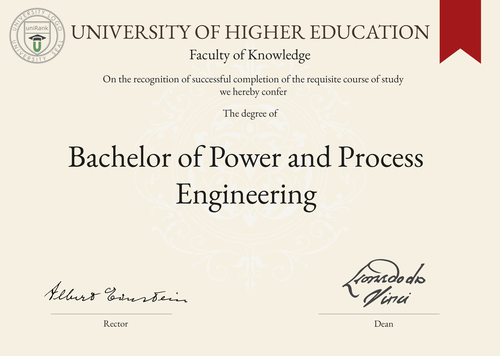
Bachelor of Power and Process Engineering (B.PPE)
Guide to Bachelor of Power and Process Engineering Program/Course/Degree
Bachelor of Power and Process Engineering (B.PPE)

Program Name:
Bachelor of Power and Process EngineeringProgram or Degree abbreviation:
B.PPEDuration range:
The duration of the program typically ranges from 3 to 4 years.Tuition range:
The tuition fees for the program can vary depending on the country and university, ranging from $10,000 to $30,000 per year.Overview:
The Bachelor of Power and Process Engineering program is designed to provide students with a comprehensive understanding of power generation, distribution and process engineering. It equips students with the necessary skills and knowledge to design, operate and maintain power plants and industrial processes.Curriculum Overview by year:
- Year 1: Introduction to Engineering, Mathematics, Physics, Chemistry, Computer Programming - Year 2: Thermodynamics, Fluid Mechanics, Electrical Engineering, Control Systems, Materials Science - Year 3: Power Generation Systems, Process Engineering, Heat Transfer, Renewable Energy, Project Management - Year 4: Industrial Internship, Advanced Power Systems, Process Optimization, Environmental Engineering, Capstone ProjectKey Components:
The key components of the program include theoretical and practical courses in power generation, process engineering, thermodynamics, fluid mechanics, control systems, renewable energy and project management. Students also gain hands-on experience through industrial internships and a capstone project.Career Prospects:
Graduates of the Bachelor of Power and Process Engineering program can pursue various career paths in industries such as power generation, oil and gas, chemical processing, manufacturing and consulting. They can work as power plant engineers, process engineers, project managers, energy consultants, or research and development specialists.Salary Expectations:
The salary expectations for graduates of the program can vary depending on factors such as the country, industry and level of experience. On average, power and process engineers can earn a starting salary of $60,000 to $80,000 per year, with potential for higher earnings as they gain more experience. For a more accurate understanding of salary expectations, you can utilize the Job Sites Search Engine, from our sister site jobRank, which searches over 4,600 job sites worldwide. Make sure to specify not only the job title but also the country you are interested in.Conclusions:
It is important to note that the duration, tuition fees, curriculum, key components, career prospects and salary expectations of the Bachelor of Power and Process Engineering program can vary depending on the chosen country or location for studying the program, as well as the chosen university. Prospective students are advised to research and compare different universities and countries to find the best fit for their educational and career goals. Visitors can search for where this specific degree, Bachelor of Power and Process Engineering, is offered anywhere in the world through the uniRank World Universities Search Engine.World Universities Search Engine
search for Bachelor of Power and Process Engineering (B.PPE) and add the Location (country, state etc.) or specific University you are interested in studying at.
Query examples:
- Bachelor of Power and Process Engineering (B.PPE) United States
- Bachelor of Power and Process Engineering (B.PPE) United Kingdom online
- Bachelor of Power and Process Engineering (B.PPE) Australia international students
- Bachelor of Power and Process Engineering (B.PPE) University of California
- Bachelor of Power and Process Engineering (B.PPE) University of London tuition fees
- Bachelor of Power and Process Engineering (B.PPE) University of Sydney scholarships
Share Program/Course
Interesting? Share this program/course/degree info with your friends now.